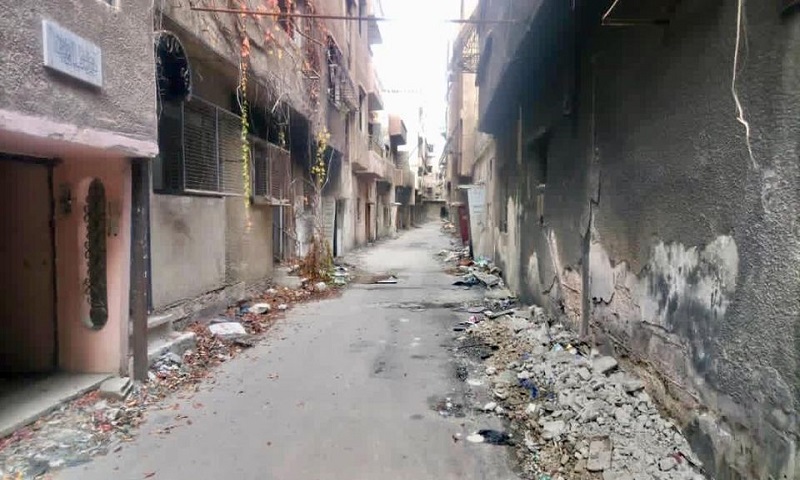



The General Company for Building and Construction (GCBC) plans to rehabilitate the water network of the Yarmouk camp for Palestinian refugees to the south of Damascus. The project will be implemented in cooperation with Damascus Water Supply and Sewage Authority (DAWSSA) and aims to repair the damages that affected water and sewage systems in the camp over the cource of the Syrian conflict.
On 23 April, the Action Group for the Palestinians of Syria (AGPS) cited well-informed sources as saying that the southern region branch of the GCBC had signed a 200 million Syrian pounds contract (64,935 USD) with the DAWSSA to rehabilitate the Yarmouk camp’s water network.
The sources added that the implementation of the project will take place in May after the end of the Eid al-Fitr holiday, while work is underway to obtain drilling licenses, equipment, and necessary materials.
The sources indicated that sanitation technicians will replace water pipes and their fittings with new ones in the camp.
The Director-General of the DAWSSA, Samer al-Hashimi, conducted an inspection visit to the Yarmouk camp on 18 February to assess the water situation.
During the visit, al-Hashimi was accompanied by the head of the Yarmouk camp’s service department, Rula Mawed. They inspected the water pump plant and Abdul Kadir al-Husseini Mosque.
Activists told the AGPS that the officials’ visit aimed at developing an action plan to initiate rehabilitation works for the camp’s water network and provide its residential neighborhoods with drinkable water.
Water and sewage pipes were systematically looted from the Yarmouk camp. Thieves and looters were seen in the camp’s neighborhoods and streets collecting pipes made of steel and plastic and loading them onto their vehicles, intending to sell them, according to the AGPS.
Palestinian activists accused security officers and members of the Syrian regime forces of leading the camp’s looting operations and selling the stolen items through middlemen in Damascus.
The camp former residents demanded the Syrian regime government, the concerned parties, the Palestine Liberation Organization (PLO), and the United Nations Relief and Works Agency for Palestine Refugees in the Near East (UNRWA) to work on securing proper infrastructure for the camp to return home as soon as possible.
Over the past few months, around 600 families were able to return to their homes in the Yarmouk camp after Damascus governorate set three conditions permitting their return. The conditions included the structural safety of properties, the availability of ownership proof, and the ability to obtain necessary security permits, according to the local pro-government al-Watan newspaper.
The camp witnessed battles between the factions of the former Free Syrian Army (FSA) and the Syrian regime forces, amid the division of the Palestinian factions between the two sides before the Islamic State (IS) took control of two-thirds of the camp in 2015.
In May 2018 and after a month-long military operation, during which IS was expelled from the camp, the regime’s forces completely re-established control over al-Hajar al-Aswad and the Yarmouk camp, in the wake of an unofficial evacuation agreement that transferred IS members to the desert areas of As-Suwayda.
The military clashes destroyed more than 60 percent of buildings and infrastructure in the Yarmouk camp, which was classified as the seventh most destroyed area in Syria, according to the “Syrian Cities Damage Atlas,” a report issued by the United Nations Institute for Training and Research (UNITAR) in cooperation with the REACH Initiative.
if you think the article contain wrong information or you have additional details Send Correction